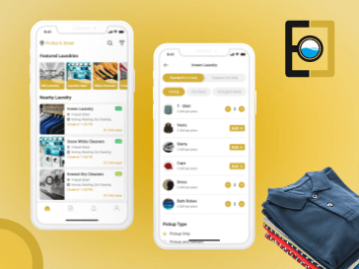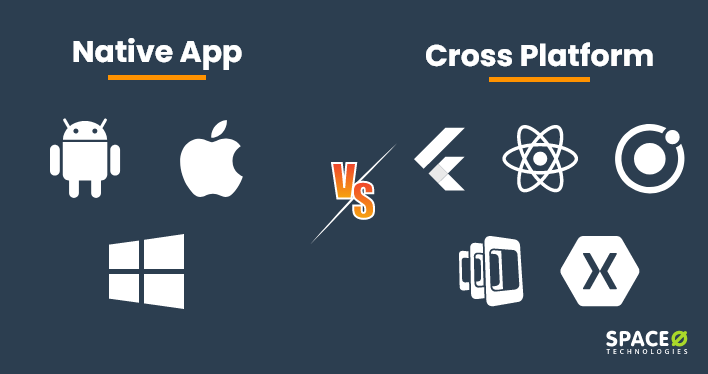A mobile app jumpstarts your transformation by making your business more visible and accessible to customers. The choice isn’t about whether you need a mobile app; it is more about what type of mobile app would your customers love.
According to Statista, mobile app downloads are consistently increasing. Especially games segment is ranking on top by having more than 100 billion downloads in the year 2021. Next comes the mobile photo and video apps with 19.6 billion downloads.
The global mobile application market is thriving with newer software development kits, programming languages, and exceptional mobile phones.
Along with choosing the type of app you want to develop, a lot of businesses also need to consider the top mobile app development company to turn their idea into a live app. The ever-increasing number of app developers (24.5 million at the moment) has become super crucial for businesses to identify the developer expertise and approach they want to take.
There are two broad app development approaches- native vs cross platform app development. In this article, we will discuss these two approaches in detail before moving toward determining the differences between them.
Table of Contents
- What is the Difference Between Native and Cross Platform Development?
- What is Native App Development?
- Apps Developed Using Native Mobile App Development
- What is Cross Platform Mobile App Development?
- Apps Developed with Cross Platform App Development Approach
- In-depth Breakdown of Native vs Cross Platform App Development
- FAQs About Native vs Cross Platform App Development
- Which Development Type Are You Planning to Choose?
What is the Difference Between Native and Cross Platform Development?
Native and cross-platform are two different development approaches that can help you release your mobile applications for a specific platform. Also, while you understand this point, it is essential for you to dive deep into knowing the difference between native app vs hybrid app as well.
If you are looking to develop mobile app development platform-specific application, you would first choose the operating system. Say, you want to develop an iOS-first application, then it is the native approach. You will develop an app individually for the platform.
The development teams and the methodologies will differ for iOS, Android, and Windows apps. Also, learn to develop iOS apps on Windows. You will estimate separate budgets for the different operating systems.
However, if you are taking the cross-platform approach, you are investing in a single code. The same code can be used for multiple platforms (iOS, Android, and Windows). You don’t need to invest separately in the different operating systems; a single team can help with building apps for the platforms.
| Differences | Native | Cross Platform |
|---|---|---|
| The Tech Stack |
Tech Stack for iOS
Tech Stack for Android
|
|
| Version Updates | When the platform is updated, the app gets updated | The cross-platform frameworks are updated a few days after the OS is updated |
| Learning Curve | It has a slight learning curve (especially Kotlin and ObjectiveC) | The learning curve is low for most of the cross-platform approaches |
What is Native App Development?
Native development is when the mobile application is tailored for specific mobile operating systems, iOS, and Android apps. As they are built to be used for a particular operating system, they follow the system’s design guidelines and can match the engagement requirements of the application.
Apart from that, asking the question, of what makes a good app also helps you develop your app in a seamless manner. You need to download the application from the specific Play Store (Apple Store for iOS, Google Play Store for Android) to the particular device to use the application.
Have a Mobile App Idea?
Share your requirements with us. We have built more than 4400 Android and iOS mobile apps for businesses across the globe.

Advantages and Disadvantages of Native App Development
Check the advantages and disadvantages of native app development.
| Advantages of Native App Development | Limitations of Native App Development |
|---|---|
|
|
Our client wanted to develop a mobile app solution for his laundry app business. To empower his on-demand laundry service app, he proposed his idea to our app development consultant. We analyzed the idea and developed a complete plan to turn his idea into a live app. Check more details about the EasyClean app in the following table.

EasyClean offers the best laundry and dry cleaning service in Saudi Arabia. Using this app, users can easily search the nearest laundry shops in their area to pick up and deliver service as per the need.
Apps Developed Using Native Mobile App Development
Here are all the apps that have been developed using the native app development approach.
| Apps | Category | Use Case | App Ratings (Play Store) |
|---|---|---|---|
 | Messenger App | Native ensures better real-time communication and end-to-end encryption | 4.3 (167,957,928 Reviews) |
 Spotify | Music App | It is used majorly to help improve the performance of a content-heavy platform. Enables better integration capabilities | 4.4 (26,707,579 Reviews) |
 Pokemon Go | Game | The application accesses the device components like GPS and camera. It uses AR technology. To ensure smooth performance while accessing components, the makers used the native app approach. | 4.3 (15,310,868 Reviews) |
You have seen the top examples of native mobile apps, next learn the meaning of cross-platform mobile app development.
What is Cross Platform Mobile App Development?
When you build an app that can be simultaneously used across multiple platforms, it is cross-platform development. A single application is compatible with all operating systems. The top mobile app development frameworks are built with superior backend technology that ensures excellent compatibility.
Advantages and Disadvantages of Cross Platform App Development
Check out the advantages and disadvantages associated with cross-platform mobile development.
| Advantages of Cross Platform App Development | Limitations of Cross Platform App Development |
|---|---|
|
|
We have discussed the advantages and limitations of cross-platform app development, next check the top apps built using cross platform development approach.
Apps Developed with Cross Platform App Development Approach
Check out the list of apps developed using cross-platform app development.
| Apps | Category | Use Case | App Ratings (Play Store) |
|---|---|---|---|
 | Social Media | Needed to deliver an app that can make image loading easy and fast. | 4 (138,671,571 votes) |
 Bloomberg | News Site | The mobile app needed in-depth analytics and real-time news update. That’s why they opted for cross-platform development. | 3.7 (76,686 Reviews) |
In-depth Breakdown of Native vs Cross Platform App Development
This in-depth comparison of the cross platform vs native mobile development helps you know the difference between the two approaches, and how to make the right choice for your needs.
- Performance of the Application
- Cost of Development
- Time to Market
- Security of the Application
- Accessibility
- User Experience
- Reach and Visibility
- Availability of Developers
Native App Development: They can access the components required to execute the mobile application without third-party services or plugins.
Cross Platform Development: These applications might need to access third-party plugins or services to integrate the device components for better interactions.
Winner: Native Mobile Apps
Reason: They can easily access the components, and execute the applications faster. As a result, they lead to high-performing applications.
Native App Development: You have to develop separate apps for specific platforms. Every app development process needs the requisite experts, resources, and development tools.
Cross Platform Development: You can develop a single application, and share it across multiple platforms. You don’t need to develop a code or frontend individually.
Winner: Cross Platform Apps
Reason: The same codebase is used to deliver the cross platform applications. As a result, you need resources, tools, and people to develop a single code. This saves a lot of costs. In the case of native, you might have to develop separate apps, which can increase the cost.
Native App Development: The development time needs to be calculated for the individual platforms. Your project timeline, development process, and methodologies will differ.
Cross Platform Development: You will spend time developing a single application, which can be shared across platforms. You won’t need to spend individual time creating applications for multiple platforms.
Winner: Cross Platform Apps
Reason: As you will spend less time developing the application, you can release the app faster. As a result, cross-platform apps are in the market earlier compared to native apps.
Native App Development: The encrypted code and underlying layers keep the data safe and secure. The native platforms, especially iOS, are created for high-end security.
Cross Platform Development: You may not get the encryption or role-based security you would with native applications.
Winner: Native
Reason: The multiple inherent security features combined with intelligent fraud detection capabilities make them safe for all types of apps. They are heavily used to protect applications in the healthcare and banking industry.
Want to Build a Secure and Fast Mobile App?
Share your requirements with our professional app development consultant, Let’s analyze them and develop a mobile app that is compatible across all the platforms.
Native App Development: These mobile applications can directly access the mobile phone components, and use them in the application. Whether they want to use the GPS or the camera, it is directly integrated.
Cross Platform Development: If you want to develop an advanced app solution with cross-platform that integrates the native device components, you need to use plugins and third-party components. It is a two-step process.
Winner: Native apps
Reason: It is easy for the native applications to integrate the device components and use them in the application, thus making the whole app execution speedy.
Native App Development: The developer will follow the design guidelines, while building iOS apps, you can follow iOS design patterns as well to build a specific framework, which can help them build the interface.
Cross Platform Development: The frontend is developed to meet the multiple platform requirements, and there are no design guidelines taken into consideration.
Winner: Native Apps
Reason: As you will notice that the application takes into consideration the platform-specific guidelines, it helps deliver a capable interface that maximizes the interactions and engagement leading to better experiences.
Native App: You will be able to reach platform-specific customers. In case you develop an application for a single platform, you are visible to a single set of customers
Cross Platform: With a single codebase, you can reach customers across platforms and operating systems.
Winner: Cross Platform Apps
Reason: With native development, you can lose out on a majority of your customers. However, with cross platform application development, you will reach all your customers easily.
Native App Development: You can hire Android app developers to build Android-specific mobile apps and similar hire iOS developers to build, test, and launch your iOS applications as well.
Cross Platform Development: You can hire Flutter or React Native app development company to develop and launch apps for Android and iOS
Winner: Cross-Platform Apps
Reason: Finding a Swift developer is slightly difficult as there are fewer developers available. However, you can find a React Native or Flutter developer with ease. Access to the developer community is one of the major reasons for choosing cross platform over native application development.
Have questions related to native and cross platform app development? Read the next section to find the answers.
FAQs About Native vs Cross Platform App Development
What is the advantage of cross-platform over native?
With cross platform app development, you can accelerate the build time and deploy the apps faster to the app stores. When it comes to delivering a quick MVP for the startup or lowering the cost of an advanced app solution, cross platform apps are far better than native applications
When to use native apps for your business?
If you want to maximize the security of your business application, you should choose native over cross platform app development. The native apps can introduce intelligent fraud detection and develop security layers that can keep your application safe from vulnerabilities
Which is the best technology for cross platform app development?
You can choose between Flutter and React Native to develop cross platform apps. The framework is complete with all cross platform tools, reduces the development cost, and can help develop apps for both Android and iOS. This is the cross platform framework that most developers prefer using.
Which Development Type Are You Planning to Choose?
Here, we discussed native vs cross platform mobile app development comparison. When you develop applications using the native approach, your interface components and user experience stay unscratched. You might notice a slight impact in the performance or experience design with cross platform development frameworks.
However, if you are a startup and planning to roll out apps for both iOS and Android, you should choose cross platform. As a leading mobile app development company, SpaceO Technologies has the right expertise, a flawless portfolio, and years of experience. If you want to translate your app idea into a solution, connect with our team.




